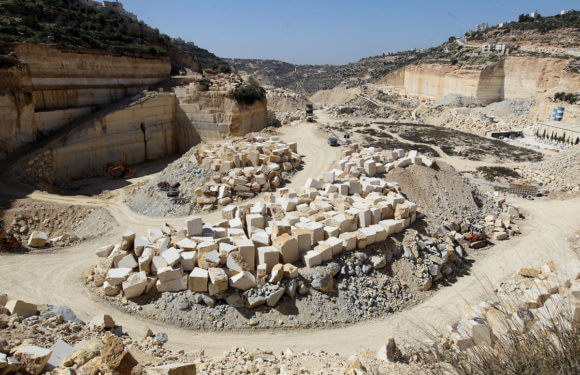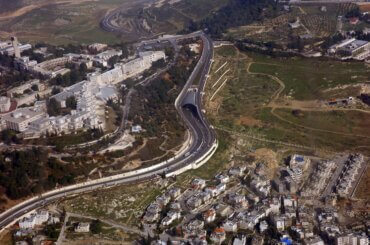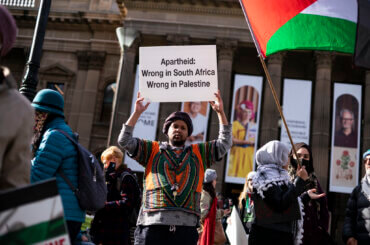STONE MEN
The Palestinians who built Israel
by Andrew Ross.
320 pp. Verso $29.95
In 1979, a young Andrew Ross did what thousands of carefree European and American youths were doing at the time: he took a “break” from the tediousness of Western life, and volunteered for a few months on a kibbutz in Israel. The charm of communal farming life, less than strenuous physical labor, and libertine revelry after sundown, lulled his otherwise critical “late hippy” soul away from following up on barely-formulated questions about the origins of Kibbutz Ginosar, where he was staying, even as he noticed that there were Palestinian employees of the kibbutz, day laborers working the land that had been stolen from them during the nakba, and leaving at sunset. Where did they go? How much were they paid? Ross never asked, as he wrapped up his volunteer stint with a visit to Egypt.
Thirty-six years later, Ross, now a professor at New York University and a labor activist, returned to Palestine to collaborate on a documentary about employment options for Palestinians in Israel. The book “Stone Men: the Palestinians who built Israel” is the result of the research he conducted between 2015 and 2017, and in many ways, it answers the questions that the young volunteer would have asked, had Egypt not called.
“Stone Men” is a sobering book in many ways, as it provides a detailed overview of labor practices in Israel and the West Bank from the early years of Zionism, to the present. (Because of the extreme restrictions on movement in and out of the Gaza Strip, Ross could not research employment conditions there). The subtitle tells the real story: just as Israel could not exist without the land of Palestine, so the country could not be built without the steady toil, skills, and dependability of Palestinian masons.
Indeed, even though the Zionist vision of the young nation was one that relied exclusively on Jewish labor, Palestinians were and remain by far the more expert stone masons, as they had been practicing the craft for centuries, with local materials. With ample deposits of the best quality dolomitic limestone in the world literally at their feet, Palestinians had honed their artisanal skills beyond compare in the region, securing a reputation as top-notch masons throughout the Middle East, where they indeed had built most of the cities. Additionally, such is the racism of colonizers that Jewish labor was a lot more expensive than Palestinian, and had to be subsidized by European Zionists eager to develop the hard-working “New Jew,” but those recent arrivals couldn’t really build much, and some of their structures collapsed. Unions–part of the early socialist Zionist vision–were also Jewish only, but even within the Jewish unions, there were different wages for Ashkenazi and Mizrahi Jews, the latter receiving “Arab wages.” And the Zionist dreamers had to deal with the pragmatic reality that, if they didn’t rely on Palestinians, they would not be able to “build Zion.”
The newly arrived European Jews could not possibly compete with the Palestinians. But as colonizers, they could exploit them. And they did. Ross’ book documents the long history of Palestinians building the Zionist national home, “from the turn of the twentieth century when the Jews of Ottoman Palestine […] depended on their building skills,” to the “modernizing wave of economic expansion under the British mandate,” to the “newly established state of Israel [which] used their labor to help house the influx of Jewish immigrants,” to the present day, when West Bank Palestinians provide cheap labor across the Green Line, as well as on the illegal but ever expanding Jewish-only settlements.
Drawing on hundreds of interviews with Palestinian “stone men” and construction workers in Israel and Palestine, Ross provides a long record of the many decades of wage theft, the denial of minimum wages and social benefits for Palestinian workers, the loss of income from border closures, checkpoint blockages, and arbitrary revocations of work permits, as Palestinians were driven to accept ever lower wages while foreign workers were brought in to keep costs down, and were losing their own homes, while building Israel. How can one quantify what Israel owes the Palestinians, the massive wage theft, the decades of unfree labor, he asks? What about the confiscated land and property? And how does one even begin to assess the devastating psychological cruelty inflicted on construction workers who are ordered to demolish their own ancestral homes, so as to make room for Israeli houses, Israeli settlements, when annexation is the new reality? “These and other liabilities are all part of the inventory of debts run up in the course of the long Nakba,” Ross writes in his closing pages.
Beyond the “bottom line,” Ross’s greater concern, however, is how the litany of wrongs can be redressed. What reparations are possible, for the Palestinians who have “built Zion,” creating the facts on the ground they have to contend with?
Israel is founded on too many fault lines. How could the socialist vision of some of its early ideologues be reconciled with Jewish protectionism? And how could the idea of equality survive the foundational supremacist ethos of the new nation? The experiment has failed. As today’s Israelis keep electing war criminals, fascists, and unrepentant mass murderers as their leaders, the fault lines are opening up into giant gaps, where the idyllic naiveté of last century’s hippie generation comes crashing like the rickety structures clumsily built by unskilled wannabes. The challenge, then, is to achieve justice, out of the rubble.
Ross suggests that the only practical way to compensate Palestinians is to have a single,
secular-democratic state for all its citizens, from the river to the sea. It is on this note that he concludes his book with a quote from one of his Palestinian interviewees: “I’ve been building homes every day over there for thirty years. In a way, it’s really my country too, isn’t it?”
I definitely agree with Ross about the one democratic country being the only viable option. But I would say it should be so, even if the Palestinian “stone men” had not built Israel. The land is ours.




It was not just stonemasons, skilled and unskilled labor of every type was in demand – hence the large scale immigration of Arabs to the region. The UNRWA recognized and codified this by only requiring 3 years of residence to become a Palestinian refugee: “persons whose normal place of residence was Palestine during the period 1 June 1946 to 15 May 1948”
The Arab migration was accelerated by the racist Jews paying more for Arab labor than their Arab brethren. Those bastards.
I thought the Zionist brain fart was to turn Jews into people who liked to work with their hands.
RE: “Drawing on hundreds of interviews with Palestinian ‘stone men’ and construction workers in Israel and Palestine, Ross provides a long record of the many decades of wage theft, the denial of minimum wages and social benefits for Palestinian workers, the loss of income from border closures, checkpoint blockages, and arbitrary revocations of work permits . . . “ ~ Nada Elia
SEE: “Permanent Temporariness” | by Alastair Crooke | London Review of Books | 3/03/11
SOURCE – http://www.lrb.co.uk/v33/n05/alastair-crooke/permanent-temporariness
Since Kibbutz Ginosar was founded in 1937, it simply cannot be true that the Palestinian employees of the kibbutz were “day laborers working the land that had been stolen from them during the nakba”. It happens in the propaganda business that one gets carried away with one’s mission of repeating and re-repeating and re-re-repeating a particular message that one forgets to check the facts. There should be a “before” and “after” even in the anti-Israel world.
Our author states: “I definitely agree with Ross about the one democratic country being the only viable option”. This statement is really quite silly. Why would anyone imagine that Ross has any particular insight into conflict solving? We are told that he’s a “labor activist”, so it might be that he doesn’t really have a grip on issues of diplomacy. I should add that our author’s choice of words (“viable option”) is really very telling. You would think that the wording should be “viable solution” (i.e. ending the conflict). There is no vision of solving the conflict, so the word “solution” is not used. An “option” is about what the next step might be, but obviously the conflict remains unresolved. Reality (“the only viable option”) is that the status quo will remain unchanged until a solution to the conflict is reached.
I was born to Jewish parents. I was NOT born a Jew, any more than I was born an R.N, a Presbyterian or a Rhodes Scholar. Judaism is a religion, not a race, not a bloodline, not a single culture, and certainly not a viable choice for morality. It is a religion which must be deliberately chosen. It is not a hereditary endowment, privileged, much less a state of being Chosen People.
Chosen for what? Assumed superiority and entitlement?
I studied Torah and Talmud for over 30 years, with my eyes open. I studied other religions.
I have to tell you that after all that study, and witnessing the rise of Zionism, that Judaism is the most racist, discriminatory and insolent system of beliefs that I have ever encountered.
Judaism, in the form of Zionism, is as evil as the Klan, ISIS, or Fundamentalist Christianity. All are nihilistic, racist and bigoted from inception, evil by intention, and reprehensible by their actions.
And please remember, the vast MAJORITY of world Jews are NOT, NOT Zionists.